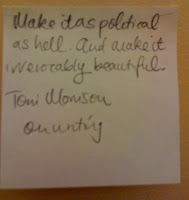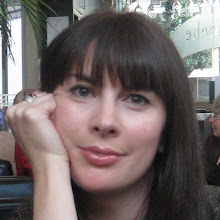Monday, November 23, 2009
what happened to the last two weeks?
Thus, I'm a TAD behind on ye olde Nanowrimo - but I am not disheartened. I've written another 2000 words today on *the book* and will just keep on at it throughout the summer. Come February, I will be revising the first draft. That's a promise.
Tuesday, November 10, 2009
losing my momentum . . . and finding it again

 marriage ceremony, both Paris and the shtetl in the background. My book must do this too - show the Adana and London, the past and the future, the dead and the living.
marriage ceremony, both Paris and the shtetl in the background. My book must do this too - show the Adana and London, the past and the future, the dead and the living. Tuesday, November 3, 2009
further updates on THE BOOK, including an imagined conversation with Toni Morrison
Sunday, November 1, 2009
NanNoWriMo: otherwise known as insanity
So these biscuits evoke for me a multitude of meanings: on one simple level they are the taste of Christmas to my family, a flavour that reminds us all of the warm kitchen and the large tree, my mother rolling out the dough and chilling it before shaping the pears with their clove stalks. On another – the story of Mrs Kassardjian who embraced my young parents so far from home on their first Christmas as soon-to-be parents, at that liminal moment before my family came into being. And more distant, more resonant – a cultural memory of a way of life I never witnessed, a side by side existence, of cultural pickpocketing, in a part of the world that we now all associate with extreme ethnic divisions. So they bring hope, in a way, that the biscuit can remind us of a hodge podge, a melange, a mongrel culture that drew on all around it, that is called one thing but claimed by another – that we can all be a little more like Mrs Kassardjian, an Armenian refugee making Greek biscuits in London for two New Zealanders who’d never been to Greece or Armenia – but who passed those flavours – almond, cloves – to their children.
I will actually blog about the process, and the loveliness of my husband and children as they live with me through this - maybe tomorrow, maybe the day after. You see, I still have to work; and cook; and do research! Tonight I'm off to share recipes with some of my favourite women . . . . some of theirs may be stolen for THE BOOK. They don't know about the evil thieving ways of writers, as of yet . . . .

